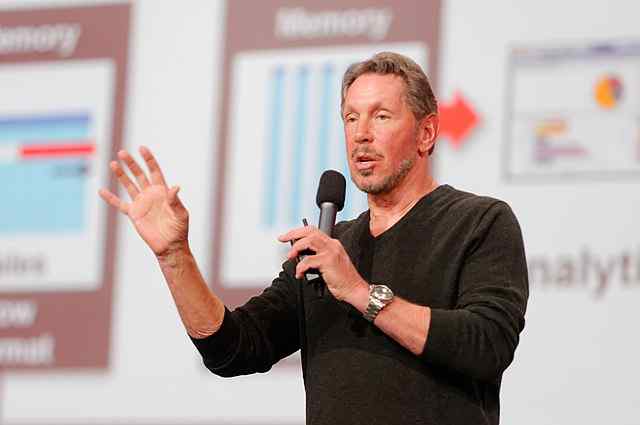In the volatile world of billionaire rankings, fortunes can shift faster than a software update. On September 10, 2025, Larry Ellison, the co-founder and chief technology officer of Oracle Corporation, experienced a meteoric rise that briefly crowned him the wealthiest person on the planet. With an estimated net worth surging to $393 billion, Ellison overtook his longtime friend and rival Elon Musk, whose fortune stood at $384 billion at the time. This dramatic leap—fueled by a blockbuster earnings report from Oracle—wasn’t just a blip; it underscored Ellison’s enduring grip on the tech industry’s financial pulse, even as he steps back from the CEO spotlight.
Ellison’s story is a classic tale of Silicon Valley ambition intertwined with shrewd financial maneuvering. Born in 1944 in New York City and raised in Chicago, Ellison dropped out of college twice before finding his footing in the nascent field of database software. In 1977, he co-founded Software Development Laboratories (later renamed Oracle) with $1,200 of his own money and a vision to commercialize relational database technology inspired by IBM’s research. What started as a scrappy startup in a rented Santa Clara garage evolved into a global powerhouse, with Oracle becoming synonymous with enterprise software.
By the time Oracle went public in 1986, Ellison’s stake had ballooned in value, marking the beginning of his ascent into the billionaire echelons. Over the decades, he navigated Oracle through aggressive acquisitions, legal battles, and market shifts, growing the company from a database specialist into a cloud computing giant. His executive tenure was marked by bold moves, including the $28.3 billion acquisition of health-tech firm Cerner in 2022, which sharpened Oracle’s focus on the lucrative healthcare sector—a bet that’s paying dividends amid booming demand for AI-driven data analytics.
Today, at 81, Ellison serves as Oracle’s CTO, a role that allows him to tinker with cutting-edge tech while his wealth compounds through ownership of roughly 42% of the company’s shares. Oracle’s fiscal 2025 performance laid the groundwork for this week’s windfall: Total revenues reached $57.4 billion, an 8% increase year-over-year (9% in constant currency), driven by cloud services and license support, which jumped 20% to $40.9 billion. The real fireworks came in the first quarter of fiscal 2026, reported just days ago on September 9. Revenues hit $14.9 billion, up 12% (11% in constant currency), with cloud revenues soaring 28% to $5.5 billion. Total remaining performance obligations—a key indicator of future revenue—exploded 359% to $455 billion, signaling robust demand for Oracle’s AI and cloud infrastructure.
The earnings beat sent Oracle’s stock skyrocketing 15% in a single day, adding over $100 billion to Ellison’s fortune in what was dubbed “the single best day ever for a billionaire.” This surge propelled Oracle’s market capitalization toward the $1 trillion club, a milestone that’s increasingly within reach as the company rides the AI wave. Yet, the stock’s volatility—down 5% in after-hours trading yesterday—highlights the risks in a market hypersensitive to tech earnings.
Beyond Oracle, Ellison’s portfolio reflects a diversified approach to wealth preservation and growth. He’s a notable investor in Tesla, holding a stake worth billions that has appreciated alongside the electric vehicle boom. Real estate remains a passion project; his holdings include the Hawaiian island of Lanai (purchased for $300 million in 2012) and a portfolio of luxury properties valued in the hundreds of millions. More recently, Ellison has channeled his resources into philanthropy with a distinctly entrepreneurial bent. The Larry Ellison Foundation, established in 2018, has poured tens of millions into infectious disease research, including efforts to combat antibiotic resistance. In 2024, he launched the Ellison Institute of Technology, a $1 billion initiative aimed at tackling global challenges like cancer and pandemics through for-profit ventures rather than traditional nonprofits—a model that blends altruism with business acumen.
Critics argue this for-profit philanthropy overlooks systemic inequities, but Ellison’s track record suggests he’s betting on innovation to drive returns—both financial and societal. His giving, while not on the scale of Gates or Buffett, totals over $1 billion to date, focused on medical research and education.
As of September 12, 2025, Ellison’s net worth hovers around $392 billion, just shy of Musk’s after market fluctuations. Whether he holds the top spot or not, his influence endures. Oracle’s pivot to cloud and AI positions it for sustained growth, potentially pushing Ellison’s fortune higher. For financial markets, Ellison remains a barometer of tech’s health: innovative, unrelenting, and fabulously wealthy. In an era of AI hype and economic uncertainty, the Oracle founder’s playbook—build, acquire, endure—offers timeless lessons for investors.





